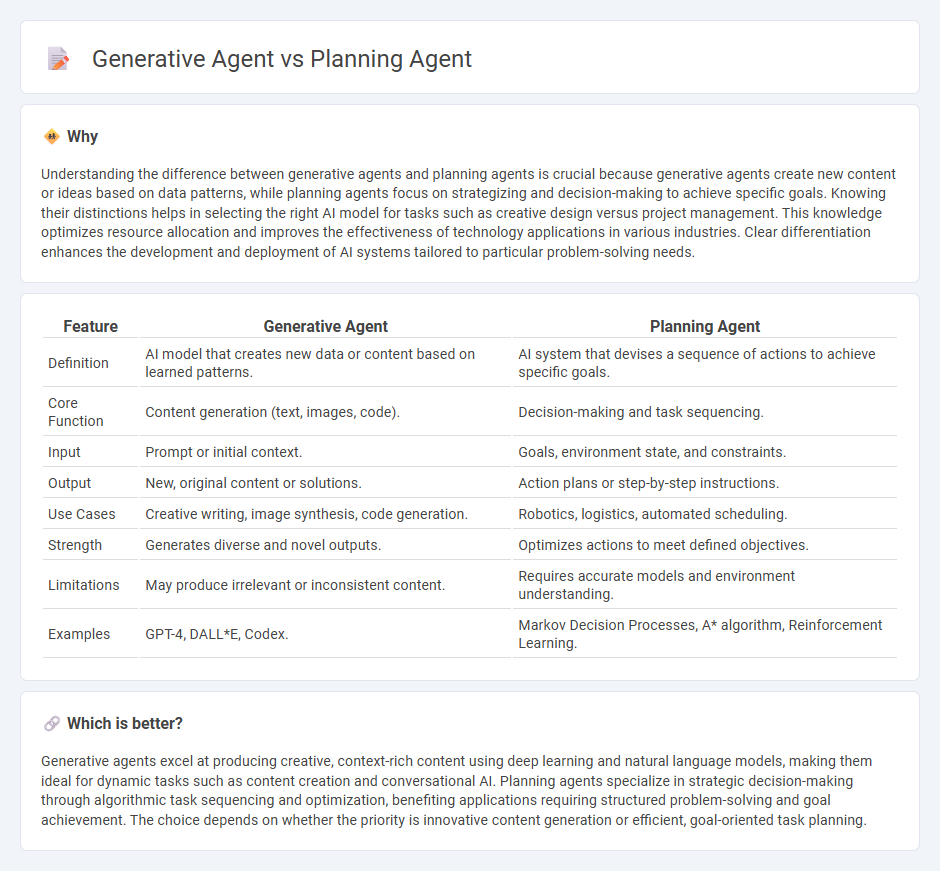
Generative agents leverage advanced machine learning models to create novel content, adapting dynamically to new inputs and contexts. Planning agents focus on strategic problem-solving by formulating step-by-step action sequences based on predefined goals and constraints. Explore the distinct capabilities and applications of generative versus planning agents to understand their impact on technology.
Why it is important
Understanding the difference between generative agents and planning agents is crucial because generative agents create new content or ideas based on data patterns, while planning agents focus on strategizing and decision-making to achieve specific goals. Knowing their distinctions helps in selecting the right AI model for tasks such as creative design versus project management. This knowledge optimizes resource allocation and improves the effectiveness of technology applications in various industries. Clear differentiation enhances the development and deployment of AI systems tailored to particular problem-solving needs.
Comparison Table
| Feature | Generative Agent | Planning Agent |
|---|---|---|
| Definition | AI model that creates new data or content based on learned patterns. | AI system that devises a sequence of actions to achieve specific goals. |
| Core Function | Content generation (text, images, code). | Decision-making and task sequencing. |
| Input | Prompt or initial context. | Goals, environment state, and constraints. |
| Output | New, original content or solutions. | Action plans or step-by-step instructions. |
| Use Cases | Creative writing, image synthesis, code generation. | Robotics, logistics, automated scheduling. |
| Strength | Generates diverse and novel outputs. | Optimizes actions to meet defined objectives. |
| Limitations | May produce irrelevant or inconsistent content. | Requires accurate models and environment understanding. |
| Examples | GPT-4, DALL*E, Codex. | Markov Decision Processes, A* algorithm, Reinforcement Learning. |
Which is better?
Generative agents excel at producing creative, context-rich content using deep learning and natural language models, making them ideal for dynamic tasks such as content creation and conversational AI. Planning agents specialize in strategic decision-making through algorithmic task sequencing and optimization, benefiting applications requiring structured problem-solving and goal achievement. The choice depends on whether the priority is innovative content generation or efficient, goal-oriented task planning.
Connection
Generative agents create content or solutions based on data inputs and learned patterns, while planning agents organize and sequence actions to achieve specific goals. The connection between generative and planning agents lies in their complementary functions; generative agents produce options or scenarios that planning agents evaluate and structure into coherent strategies. This integration enhances autonomous systems by combining creative generation with strategic execution in fields like robotics, AI-driven scheduling, and simulation environments.
Key Terms
Goal-driven behavior (Planning agent)
Planning agents excel in goal-driven behavior by systematically generating sequences of actions to achieve specific objectives, leveraging algorithms like A* or dynamic programming for optimal pathfinding and decision-making. These agents rely heavily on explicit models of the environment and pre-defined goals to plan future actions efficiently, ensuring predictable and reliable outcomes. Discover the distinct mechanisms that differentiate planning agents from generative agents in driving autonomous decision processes.
Reactive adaptation (Generative agent)
Generative agents showcase superior reactive adaptation by continuously updating their internal models based on new experiences, enabling flexible and context-aware decision-making. Unlike planning agents that rely on predetermined strategies and explicit goal-oriented actions, generative agents dynamically interpret and respond to changing environments in real-time. Explore how reactive adaptation in generative agents revolutionizes AI responsiveness and learning capabilities.
Decision-making framework
Planning agents utilize predefined algorithms and models to systematically evaluate potential actions and outcomes, optimizing decisions based on goal-oriented frameworks such as Markov Decision Processes or heuristic search methods. Generative agents employ advanced neural networks, often leveraging deep learning and reinforcement learning, to simulate human-like reasoning and adapt dynamically by generating novel strategies in uncertain or complex environments. Explore further to understand how these decision-making paradigms influence agent adaptability and efficiency in real-world applications.
Source and External Links
Plan-and-Execute Agents - LangChain Blog - These agent architectures separate an LLM-powered "planner" from the tool execution runtime, making multi-step workflows faster, cheaper, and more performant by reducing calls to large models and using smaller models for sub-tasks.
How to Build AI Agents Using Plan-and-Execute Loops - This tutorial demonstrates building an autonomous "plan-and-execute" agent in Python, which uses LLM reasoning to create a step-by-step plan and then autonomously executes it using real-world tools like web browsers.
Understanding the planning of LLM agents: A survey - This academic survey provides a systematic taxonomy of LLM-based agent planning methods, categorizing approaches into Task Decomposition, Plan Selection, External Modules, Reflection, and Memory.
 dowidth.com
dowidth.com